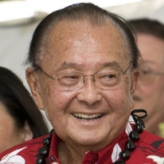After the death of Senator Robert W. Byrd (D-West Virginia) on June 28, 2010, a bona fide war hero, Senator Daniel Inouye (D-Hawaii), served as President Pro Tempore of the U.S. Senate. The President pro tempore (aka President pro tem, Latin meaning “for the time being”) is the second-highest-ranking official of the United States Senate, the highest-ranking Senator, and third in line of succession to the President, after the Vice President and the Speaker of the House. The U.S. Constitution states that the Vice President is the President of the Senate, voting only in case of a tie. During the Vice President’s absence, the President pro tem is the highest-ranking official in the Senate and may preside over its sessions. The President pro tem is elected by the Senate and is customarily the most senior Senator in the majority party.
Born September 7, 1924, in Honolulu, Hawai’i, the son of Kame (née Imanaga) and Hyotaro Inouye, Daniel Inouye is a Nisei Japanese-American (an American-born child of Japanese immigrants) and grew up in Honolulu. He was at Pearl Harbor as a medical volunteer during the Japanese attack on December 7, 1941. In 1943, when the U.S. Army dropped its ban on Japanese-Americans, Inouye ended his premedical studies at the University of Hawai’i and enlisted in the Army. He was assigned to the Nisei 442nd Regimental Combat Team, which became the most-highly decorated unit in Army history.
Promoted to the rank of second lieutenant for his platoon leadership, on April 21, 1945, Inouye was grievously wounded while leading an assault on a heavily-defended ridge near Terenzo, Italy, called
Colle Musatello. Leading his platoon against an entrenched German machine gun unit only 40 yards away, Inouye stood up to attack and was shot in the stomach. Ignoring his wound, he proceeded to attack and destroy the first machine gun nest with hand grenades and submachine gun fire. Informed of the severity of his wound by his platoon sergeant, Inouye refused treatment and rallied his men for an attack on the second machine gun position, which he also destroyed before collapsing from blood loss. As his squad distracted the third machine gunner, Inouye crawled to within 10 yards of the final bunker. As he raised himself up and cocked his arm to throw his last grenade into the nest, German
rifle grenade fire struck him on the right elbow, severing most of his arm and leaving his own primed grenade reflexively
“clenched in a fist that suddenly didn't belong to me anymore.”
Inouye’s horrified soldiers moved to his aid, but he ordered them to keep back, fearing his severed fist would involuntarily relax and drop the grenade. As the German inside the bunker reloaded his rifle, Inouye managed to pry the live grenade from his useless right hand and transfer it to his left. As the German aimed his rifle to finish him off, Inouye managed at last to toss the grenade into the bunker and destroy it. He stumbled to his feet and continued forward, silencing the last German resistance with a one-handed burst from his Thompson before being wounded in the leg and tumbling unconscious to the bottom of the ridge. When he awoke with his men hovering over him, he gruffly ordered them return to their positions, since,
“nobody had called off the war.”
After the war, Inouye remained in the military until 1947 and was honorably discharged with the rank of captain. Owing to the loss of his arm, he abandoned his plans to become a surgeon, and returned to college under the GI Bill. He earned a B.A. in political science from the University of Hawai’i at Manoa in 1950, and a law degree from The George Washington University Law School in Washington, D.C., in 1953.
Soon afterward, he was elected to the territorial legislature, of which he was a member until shortly before Hawai’i achieved statehood in 1959. He won a seat in the U.S. House of Representatives as Hawai’i’s first full member, and took office on August 21, 1959, the same date Hawaii became a state; he was re-elected in 1960, and elected to the Senate in 1962. As of January 3, 2011, Inouye had served in the Senate exactly 48 years, making him the second longest serving Senator in history, behind his predecessor at President pro tem, Senator Robert Byrd of West Virginia, who served 51 years, 176 days. Inouye would break that mark on June 28, 2014.
High points of Inouye’s career have included his delivery of the keynote address at the turbulent 1968 Democratic National Convention in Chicago, his service on the
Senate Watergate Committee in 1973 and 1974, his chairmanship of the Select Committee on Intelligence from 1975 to 1979, and his chairmanship of the
Senate Iran-Contra Committee from 1987 to 1989. During the hearings Inouye summarized the cover-up by
saying, “There exists a shadowy Government with its own Air Force, its own Navy, its own fundraising mechanism, and the ability to pursue its own ideas of the national interest, free from all checks and balances, and free from the law itself.”
Inouye married Margaret Shinobu Awamura in 1949; the couple had a son, Ken. After his wife’s death in 2006, Inouye in 2008 married Irene Hirano, who is President of the
U.S.-Japan Council. A lifelong Democrat, Inouye has participated in party politics continuously since at least the early 1950s, and has contributed thousands of dollars to its candidates and causes.





